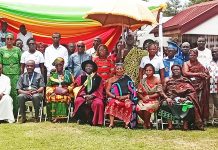
The Vice-Chancellor (VC) of the Sunyani Technical University (STU), Professor Ing. Kwadwo Adinkrah-Appiah has encouraged graduates from the university to use the skills they have acquired during the course of their training to start their own businesses.
Professor Adinkrah-Appiah noted that the current challenges of unemployment in the country provide an opportunity for graduates to start their own businesses with the skills they have acquired.
“The numerous gaps created by the ravages of the COVID-19 pandemic in the national and global economies serve as opportunities for engineering, TVET and entrepreneurially-skilled graduates, which you are. You must, therefore, apply all the technical, professional and entrepreneurial skills you have acquired from the STU to make a difference in your own lives and that of the nation”, he said.
Speaking at the 14th congregation of the university, the VC stressed, “start your own businesses and grow them into big enterprises. Form partnerships with your friends and families and with determination and God on your side, you will succeed.”
Professor Adinkrah-Appiah called on the government to give financial clearance to the institution to be able to employ more staff.“We thank the government for the financial clearance granted to the university last year that enabled us to recruit 114 new staff and faculty. However, the current faculty strength of 240 implies that the student-faculty ratio of the university stands at 1:28, which is in excess of the GTEC requirements. We, therefore, urge the government to grant a new financial clearance for the university to recruit more faculty members to improve the existing student-teacher ratio.”
GRADUATES
A total of 1,779 graduates were awarded Bachelor of Technology, Higher National Diploma and Diploma Certificates in Engineering, TVET, Applied Science and Technology, Applied Arts, as well as Business and Management Studies disciplines.
Out of the graduating list, 1,107 representing 62.2% were males, whilst 672, which is 37.8% were females. In all, 223 graduates representing 12.5% obtained first-class honours; 992 (55.8%) obtained second class upper honours; 541 (30.4%) obtained second class lower honours and 23 which is 1.3% obtained pass.
STEM
The Director of Tertiary Education, Dr Eric Nkanaah, who represented the Education Minister; Dr Yaw OseiA dutwum, noted that the government has put in place many initiatives to increase the number of students who study STEM at the tertiary level.“The government is expanding and resourcing the science laboratories of existing Senior High Schools (SHSs) and also building new resource centres. The government is also building 10 new STEM boarding schools across the country”, he said.
TECHNOLOGY FOR DEVELOPMENT
The chairman of the Sunyani Technical University, Dr Kwame Agyemang Boakye indicated that Technical Universities (TUs) must be positioned strategically to form the natural technology nodes for national development. To be successful in this direction, Dr Agyemang Boakye said stakeholders must work consciously to ensure that TUs are appropriately directed, resourced, supported and managed.
He expressed discomfort about the poor road network on campus, which housed some faculties including the university’s ultra-modern AVIC laboratory and the Mechatronic Laboratory is in a deplorable condition. He pointed out that “during the dry season the road is engulfed with dust whilst it becomes muddy during the rainy season.” Dr Agyemang Boakye, therefore, appealed to the government to provide an asphaltic overlay for the road, in particular, and other existing roads on campus.
STU IS 55 YEARS OLD
Dr Agyemang Boakye also launched the 55th anniversary of the institution and a GHc300 million education endowment fund to push human resource and infrastructure development.
He said the “STU Endowment Fund” targeted to mobilize GHc50 million by the close of 2022, and therefore, called on the more than 40,000 alumni of the university to contribute to the fund.
The theme for the anniversary celebration is “STU 55 years of progress and achievement in TVET and engineering education: mobilizing excellence for leadership in Ghana’s industrialization agenda”.
Dr Boakye who pledged GHc10, 000 in support of the fund, explained the university’s numerical strength has grown and added that it was imperative for the university to devise strategies to generate the needed revenue required to implement its Strategic Master Plans.
STRATEGIC AND MASTER PLANS
Last year, the STU launched its Strategic and Master Plans, which fashioned the development of the university over a five year period (2020-2025) as well as a focus on the long term sustainable infrastructure development respectively.
TVET
The Bono Regional Minister, Madam Justina Owusu-Banahene, said the government recognises and places a high premium on TVET, as a key driver and pillar of national development.
According to her, it is for that reason that President Akufo-Addo’s administration has given TVET higher priority and attention by introducing fundamental reforms to mainstream the sector for the benefit of the youth.
“The ultimate aim is to secure for ourselves, a skilled workforce to promote industrialization and self-reliance,” she said. The regional minister explained that TVET holds huge potential for the development of human capital for nation building, and therefore, it is important that the government gives it premium attention.
HISTORY
The STU was established in 1967 as Sunyani Technical Institute (SUTECH) by Ghana’s first president Dr Kwame Nkrumah to offer opportunities for middle school leavers, and later Junior Secondary School graduates, to undergo hands-on training in craft programmes.
The programmes included intermediate block-laying and concreting, carpentry and joinery, furniture craft, painting and decoration, electrical installation, motor vehicle mechanics, welding and fabrication.
In 1997, the institute was upgraded to a Polytechnic following the government’s decision to lay more emphasis on TVET and it then became Sunyani Polytechnic, running a wide range of tertiary, non-tertiary and certificate programmes, with a focus to produce middle-level manpower graduates.
In 2016, the institution was converted from a Polytechnic to a Technical University with a new mandate to provide higher education and awarded its own degrees, diplomas and other certificates in engineering, science and technology-based disciplines, TVET as well as Applied Arts and related disciplines, as enshrined in the Technical Universities ACT 2016 (ACT 922 as amended).
The Vice-Chancellor of the university, Professor Adinkrah-Appiah, paid glowing tribute to the founding fathers of the institution including the chiefs, opinion leaders and Dr Kwame Nkrumah under whose instrumentality, as well as the successive governments whose vision helped upgrade the institution from a technical institute to the present-day university.
“We equally acknowledge the great leadership of the current President Nana Addo Danquah Akufo-Addo for his great vision of transforming the TVET sector of the country, which has gone a long way in retooling the STU on a









